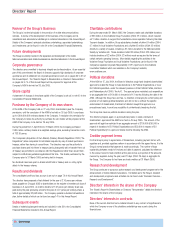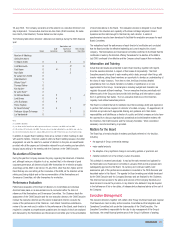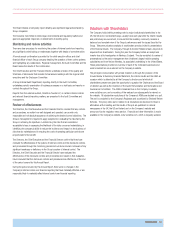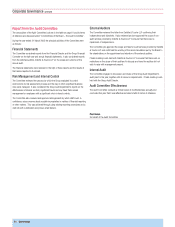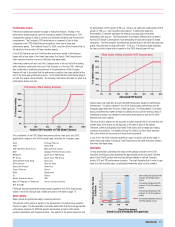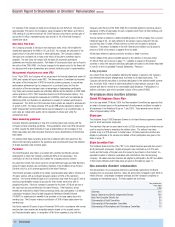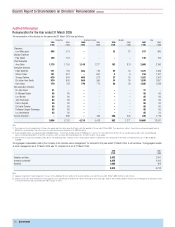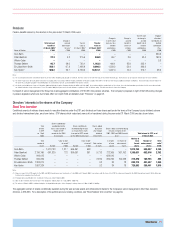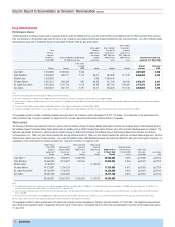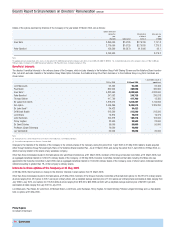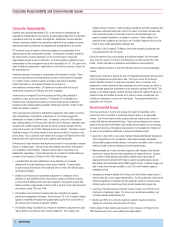Vodafone 2005 Annual Report Download - page 68
Download and view the complete annual report
Please find page 68 of the 2005 Vodafone annual report below. You can navigate through the pages in the report by either clicking on the pages listed below, or by using the keyword search tool below to find specific information within the annual report.
Board’s Report to Shareholders on Directors’ Remuneration continued
66 |Governance
Each element of the reward package focuses on supporting different Company
objectives, which are illustrated below:
The principles of the Policy are cascaded, where appropriate, to executives below
Board level as set out below:
Report on Executive Directors’ Remuneration for the
2005 Financial Year and Subsequent Periods
Total remuneration levels
In accordance with the Policy, the Company benchmarks total remuneration levels
against other large European domiciled companies, using externally provided pay data.
Total remuneration for these purposes means the sum of base salary and short,
medium and long term incentives. The European focus was selected because Europe
continues to be Vodafone’s major market and the Company is one of the top ten
companies in Europe by market capitalisation. The competitive data is used as one
input to determine the remuneration level of the Chief Executive and Board. The
Committee also takes into account other factors including personal and Company
performance in determining the target remuneration level.
Components of executive directors’ remuneration
Executive directors receive base salary, short/medium term incentive (annual deferred
share bonus), long term incentives (performance shares and share options) and pension
benefits. Vesting of all incentives is dependent on the achievement of performance
targets that are set by the Remuneration Committee prior to the awards being granted.
Base salary
Salaries are reviewed annually with effect from 1 July and adjustments may be made
to reflect competitive national pay levels, the prevailing level of salary reviews of
employees within the Group, changes in responsibilities, Group and individual
performance. External remuneration consultants provide data about market salary
levels and advise the Committee accordingly. Pension entitlements are based only on
base salary.
Incentive awards
Short/medium term incentive: Annual deferred share bonus
The purpose of the Vodafone Group Short Term Incentive Plan (“STIP”) is to focus and
motivate executive directors to achieve annual business KPIs that will further the
Company’s medium term objectives. The STIP awards made in July 2002 vested in
July 2004. Details of STIP awards are given in the table on page 71.
The STIP comprises two elements: a base award and an enhancement award. Release
of both elements after three years is dependent upon the continued employment of the
participant.
Base award
The base award is earned by achievement of one year KPI linked performance targets
and is delivered in the form of shares. The target base award level for the 2005
financial year was 100% of salary with a maximum of 200% of salary available for
exceptional performance.
The Remuneration Committee reviews and sets the base award performance targets
on an annual basis, taking into account business strategy. The performance measures
for the 2005 financial year relate to EBITDA, total service revenue, free cash flow and
customer satisfaction. Each element is weighted according to the responsibilities of the
relevant director. For the Chief Executive, in the 2005 financial year, the EBITDA target
was 40% of the total, total service revenue 25%, free cash flow 20% and customer
satisfaction 15%, and the payout achieved was 104%. The targets are not disclosed,
as they are commercially sensitive. For the 2006 financial year, the EBITDA measure
will be replaced with Operating Profit (EBIT) and increased focus will be placed on total
service revenue. Free Cash Flow remains a key measure and the customer satisfaction
measure is retained and enhanced.
The Group may, at its discretion, pay a cash sum of up to the value of the base award
in the event that an executive director declines the share award. In these
circumstances, the executive director will not be eligible to receive the enhancement
award or any cash alternative.
Enhancement award
An enhancement award of 50% of the number of shares comprised in the base award
is earned by achievement of a subsequent two-year EPS performance target following
the initial twelve-month period. For awards made in the 2005 financial year, which will
vest in July 2006, the performance target was that growth in EPS, before goodwill
amortisation and exceptional items, must equal or exceed 16% over the two-year
performance period.
The Company is reviewing the current STIP and may propose changes to the design of
the plan to enhance its effectiveness and enable it to be operated outside the UK for
the Company’s international senior executives. Any changes to the plan will be
discussed with major shareholders and relevant institutions with a view to applying the
changes to bonuses earned in the 2006 financial year.
Long term incentives
Awards of performance shares and share options were made to executive directors
following the 2004 AGM on 28 July 2004. The awards for the 2005 financial year will
be also be made following the AGM.
Awards are delivered in the form of ordinary shares of the Company. All awards are
made under plans that incorporate dilution limits as set out in the Guidelines for Share
Incentive Schemes published by the Association of British Insurers. The current
estimated dilution from subsisting awards, including executive and all-employee share
awards, is approximately 2.4% of the Company’s share capital at 31 March 2005
(2.1% as at 31 March 2004).
Performance
Purpose Measure(s)
Base Short/Medium Long Term
salary Term Incentive Incentives
Executive Set against Conditional on Annual awards of
Committee national business performance performance shares
market relevant to individual and share options with
executive performance conditions
Target bonus level
competitive in local
market
•Reflects competitive •Individual contribution
Base salary market level, role and
individual achievement
•Motivates achievement of • EBITDA (to be replaced
annual business KPIs with EBIT from
Annual •Provides incentive to co-invest 1 April 2005)
deferred •Motivates achievement of • Free cash flow
share bonus medium term KPIs •Total service revenue
•Aligns with shareholders •Customer satisfaction
•Adjusted EPS growth
on share deferral
•Incentivise earnings growth • Adjusted EPS growth
Share options and share price growth
•Aligns with shareholders
Performance •Incentivise share price and •Relative Total
shares dividend growth Shareholder Return
•Aligns with shareholders (“TSR”)




